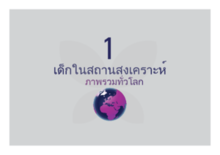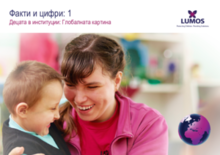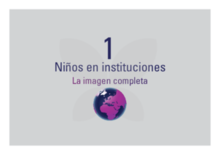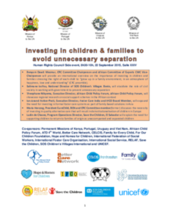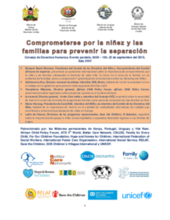Displaying 361 - 370 of 691
เอกสารฉบับนี้แผนที่จำนวนของเด็กที่อาศัยอยู่ในสถาบันการศึกษาทั่วโลก ประมาณหนึ่งทำให้รวมถึงแปดล้านบาทแม้ว่าช่องว่างที่กำหนดในระดับโลกและสถิติบ่งชี้ว่ามีหลายบ้านของเด็กที่ไม่ได้จดทะเบียนของตัวเลขที่แท้จริงอาจจะดีที่สูงขึ้นมาก
Тази публикация карти на броя на децата, живеещи в институции по целия свят.
Esta publicación muestra el número de niños que viven en instituciones de todo el mundo.
This video gives an inside look at an assisted family setting in Ghana where children with disabilities live with their foster mothers. It highlights the increased risk of family separation faced by children with special needs and advocates for the provision of quality family-based care to children who cannot be with their parents or extended families.
This Human Rights Council Side event included presentations on family separation in the African, Asian, European, and Latin American contexts.
This video is presented by Better Care Network and UNICEF. It tells the story of Maureen, a young girl in Kenya who was separated from her family and sent to live in a children's home. It also features interviews with experts, including those who have lived in children's homes, explaining some of the negative impacts of institutionalization and highlights the efforts of Care Reform Initiatives to deinstitutionalize children in Kenya and Ghana.
Este evento paralelo del Consejo de Derechos Humanos incluyó presentaciones en separación familiar en los contextos africanos, asiáticos, europeos, y latinoamericanos.
This video is presented by Better Care Network and UNICEF. It tells the story of Maureen, a young girl in Kenya who was separated from her family and sent to live in a children's home. The video also features interviews with experts, including those who have lived in children's homes, explaining some of the negative impacts of institutionalization and highlights the efforts of care reform initiatives to deinstitutionalize children in Kenya.
This article is an attempt to analyse and describe the process of change in child substitute care that has taken place since the re-independence of Estonia in 1991.
This animated video from Lumos, narrated by Lumos founder J.K. Rowling, illustrates the “tragic consequences of orphanage care,” and argues that more can and should be done to support families to care for their children, eliminating the use of institutional care.

